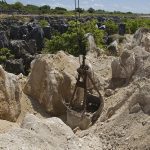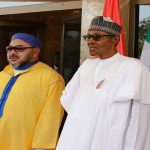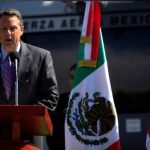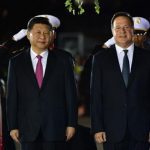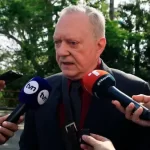Panama authorities have detained a Moroccan phosphate shipment from the disputed territory of Western Sahara after the Polisario independence movement claimed the cargo had been transported illegally, Polisario and officials said on Thursday.
The detention of the vessel carrying phosphate rock cargo from Morocco’s OCP for Canada’s Agrium is the second tanker stopped this month by a Polisario legal challenge, a new tactic the independence movement has been using in its conflict with Morocco.
Western Sahara has been disputed since 1975, when Morocco claimed it as part of the kingdom and the Polisario fought a guerrilla war for the Sahrawi people’s independence. A 1991 ceasefire split the region in two between what Morocco calls its southern provinces and an area controlled by Polisario.
The two sides have been locked in diplomatic battles since the U.N.-backed ceasefire over how to decide on the region’s self-determination, but repeated U.N. negotiations have failed to reach a deal.
The Danish charter vessel Ultra Innovation, carrying 55,000 tonnes of phosphate rock from Morocco’s OCP through Panama to Port of Vancouver for Agrium, was held on Wednesday night under a maritime court order, Polisario said.
By seeking the seizure of the two phosphate vessels, Polisario is putting to the test a European court ruling last year that Western Sahara should not be considered part of the Moroccan kingdom in EU and Moroccan deals.
“We are optimistic this second recourse to applying the law to bring an end to the blatant theft of a resource belonging to a people under occupation will demonstrate our resolve,” Polisario chief negotiator Mohamed Khadad said.
A sparsely populated stretch of desert bordering the Atlantic Ocean, Western Sahara has rich fishing grounds as well as phosphate. A heavily mined earth wall separates Moroccan-controlled territory and Polisario-held areas.
Morocco’s OCP, or Office Cherifien de Phosphate (OCP), is the world’s leading phosphate exporter and operates in the Moroccan-held areas. It did not return several calls and messages seeking comment on the Panama challenge.
Agrium said in a statement that it was aware of the detained phosphate rock shipment in Panama.
“We are currently working with our charter company (Ultrabulk) to work through the situation. At this time we don’t anticipate any production interruptions at our facility in Alberta (Redwater),” the company said.
A Panama maritime authority source confirmed the vessel was being held in port in Panama by a judicial investigation.
Earlier in the month, the Marshall Island-flagged NM Cherry Blossom, also carrying phosphate from Laayoune in the Moroccan part of the disputed territory for OCP, was detained in South Africa’s Port Elizabeth under a civil maritime court order.
On Thursday, the South African court reserved a judgement on the case and extended the hold on the vessel to 9 June.
The United Nations Security Council has called for fresh negotiations between Morocco and the Polisario, which runs its self-declared Sahrawi Arab Democratic Republic or SADR.
Talks have failed for years to end the dispute. Morocco wants the region to have autonomy within Moroccan sovereignty. Polisario wants to hold a referendum on self-determination, including on the question of independence.
Panama authorities have detained a Moroccan phosphate shipment from the disputed territory of Western Sahara after the Polisario independence movement claimed the cargo had been transported illegally, Polisario and officials said on Thursday.
The detention of the vessel carrying phosphate rock cargo from Morocco’s OCP for Canada’s Agrium is the second tanker stopped this month by a Polisario legal challenge, a new tactic the independence movement has been using in its conflict with Morocco.
Western Sahara has been disputed since 1975, when Morocco claimed it as part of the kingdom and the Polisario fought a guerrilla war for the Sahrawi people’s independence. A 1991 ceasefire split the region in two between what Morocco calls its southern provinces and an area controlled by Polisario.
The two sides have been locked in diplomatic battles since the U.N.-backed ceasefire over how to decide on the region’s self-determination, but repeated U.N. negotiations have failed to reach a deal.
The Danish charter vessel Ultra Innovation, carrying 55,000 tonnes of phosphate rock from Morocco’s OCP through Panama to Port of Vancouver for Agrium, was held on Wednesday night under a maritime court order, Polisario said.
By seeking the seizure of the two phosphate vessels, Polisario is putting to the test a European court ruling last year that Western Sahara should not be considered part of the Moroccan kingdom in EU and Moroccan deals.
“We are optimistic this second recourse to applying the law to bring an end to the blatant theft of a resource belonging to a people under occupation will demonstrate our resolve,” Polisario chief negotiator Mohamed Khadad said.
A sparsely populated stretch of desert bordering the Atlantic Ocean, Western Sahara has rich fishing grounds as well as phosphate. A heavily mined earth wall separates Moroccan-controlled territory and Polisario-held areas.
Morocco’s OCP, or Office Cherifien de Phosphate (OCP), is the world’s leading phosphate exporter and operates in the Moroccan-held areas. It did not return several calls and messages seeking comment on the Panama challenge.
Agrium said in a statement that it was aware of the detained phosphate rock shipment in Panama.
“We are currently working with our charter company (Ultrabulk) to work through the situation. At this time we don’t anticipate any production interruptions at our facility in Alberta (Redwater),” the company said.
A Panama maritime authority source confirmed the vessel was being held in port in Panama by a judicial investigation.
Earlier in the month, the Marshall Island-flagged NM Cherry Blossom, also carrying phosphate from Laayoune in the Moroccan part of the disputed territory for OCP, was detained in South Africa’s Port Elizabeth under a civil maritime court order.
On Thursday, the South African court reserved a judgement on the case and extended the hold on the vessel to 9 June.
The United Nations Security Council has called for fresh negotiations between Morocco and the Polisario, which runs its self-declared Sahrawi Arab Democratic Republic or SADR.
Talks have failed for years to end the dispute. Morocco wants the region to have autonomy within Moroccan sovereignty. Polisario wants to hold a referendum on self-determination, including on the question of independence.
Panama authorities have detained a Moroccan phosphate shipment from the disputed territory of Western Sahara after the Polisario independence movement claimed the cargo had been transported illegally, Polisario and officials said on Thursday.
The detention of the vessel carrying phosphate rock cargo from Morocco’s OCP for Canada’s Agrium is the second tanker stopped this month by a Polisario legal challenge, a new tactic the independence movement has been using in its conflict with Morocco.
Western Sahara has been disputed since 1975, when Morocco claimed it as part of the kingdom and the Polisario fought a guerrilla war for the Sahrawi people’s independence. A 1991 ceasefire split the region in two between what Morocco calls its southern provinces and an area controlled by Polisario.
The two sides have been locked in diplomatic battles since the U.N.-backed ceasefire over how to decide on the region’s self-determination, but repeated U.N. negotiations have failed to reach a deal.
The Danish charter vessel Ultra Innovation, carrying 55,000 tonnes of phosphate rock from Morocco’s OCP through Panama to Port of Vancouver for Agrium, was held on Wednesday night under a maritime court order, Polisario said.
By seeking the seizure of the two phosphate vessels, Polisario is putting to the test a European court ruling last year that Western Sahara should not be considered part of the Moroccan kingdom in EU and Moroccan deals.
“We are optimistic this second recourse to applying the law to bring an end to the blatant theft of a resource belonging to a people under occupation will demonstrate our resolve,” Polisario chief negotiator Mohamed Khadad said.
A sparsely populated stretch of desert bordering the Atlantic Ocean, Western Sahara has rich fishing grounds as well as phosphate. A heavily mined earth wall separates Moroccan-controlled territory and Polisario-held areas.
Morocco’s OCP, or Office Cherifien de Phosphate (OCP), is the world’s leading phosphate exporter and operates in the Moroccan-held areas. It did not return several calls and messages seeking comment on the Panama challenge.
Agrium said in a statement that it was aware of the detained phosphate rock shipment in Panama.
“We are currently working with our charter company (Ultrabulk) to work through the situation. At this time we don’t anticipate any production interruptions at our facility in Alberta (Redwater),” the company said.
A Panama maritime authority source confirmed the vessel was being held in port in Panama by a judicial investigation.
Earlier in the month, the Marshall Island-flagged NM Cherry Blossom, also carrying phosphate from Laayoune in the Moroccan part of the disputed territory for OCP, was detained in South Africa’s Port Elizabeth under a civil maritime court order.
On Thursday, the South African court reserved a judgement on the case and extended the hold on the vessel to 9 June.
The United Nations Security Council has called for fresh negotiations between Morocco and the Polisario, which runs its self-declared Sahrawi Arab Democratic Republic or SADR.
Talks have failed for years to end the dispute. Morocco wants the region to have autonomy within Moroccan sovereignty. Polisario wants to hold a referendum on self-determination, including on the question of independence.
Panama authorities have detained a Moroccan phosphate shipment from the disputed territory of Western Sahara after the Polisario independence movement claimed the cargo had been transported illegally, Polisario and officials said on Thursday.
The detention of the vessel carrying phosphate rock cargo from Morocco’s OCP for Canada’s Agrium is the second tanker stopped this month by a Polisario legal challenge, a new tactic the independence movement has been using in its conflict with Morocco.
Western Sahara has been disputed since 1975, when Morocco claimed it as part of the kingdom and the Polisario fought a guerrilla war for the Sahrawi people’s independence. A 1991 ceasefire split the region in two between what Morocco calls its southern provinces and an area controlled by Polisario.
The two sides have been locked in diplomatic battles since the U.N.-backed ceasefire over how to decide on the region’s self-determination, but repeated U.N. negotiations have failed to reach a deal.
The Danish charter vessel Ultra Innovation, carrying 55,000 tonnes of phosphate rock from Morocco’s OCP through Panama to Port of Vancouver for Agrium, was held on Wednesday night under a maritime court order, Polisario said.
By seeking the seizure of the two phosphate vessels, Polisario is putting to the test a European court ruling last year that Western Sahara should not be considered part of the Moroccan kingdom in EU and Moroccan deals.
“We are optimistic this second recourse to applying the law to bring an end to the blatant theft of a resource belonging to a people under occupation will demonstrate our resolve,” Polisario chief negotiator Mohamed Khadad said.
A sparsely populated stretch of desert bordering the Atlantic Ocean, Western Sahara has rich fishing grounds as well as phosphate. A heavily mined earth wall separates Moroccan-controlled territory and Polisario-held areas.
Morocco’s OCP, or Office Cherifien de Phosphate (OCP), is the world’s leading phosphate exporter and operates in the Moroccan-held areas. It did not return several calls and messages seeking comment on the Panama challenge.
Agrium said in a statement that it was aware of the detained phosphate rock shipment in Panama.
“We are currently working with our charter company (Ultrabulk) to work through the situation. At this time we don’t anticipate any production interruptions at our facility in Alberta (Redwater),” the company said.
A Panama maritime authority source confirmed the vessel was being held in port in Panama by a judicial investigation.
Earlier in the month, the Marshall Island-flagged NM Cherry Blossom, also carrying phosphate from Laayoune in the Moroccan part of the disputed territory for OCP, was detained in South Africa’s Port Elizabeth under a civil maritime court order.
On Thursday, the South African court reserved a judgement on the case and extended the hold on the vessel to 9 June.
The United Nations Security Council has called for fresh negotiations between Morocco and the Polisario, which runs its self-declared Sahrawi Arab Democratic Republic or SADR.
Talks have failed for years to end the dispute. Morocco wants the region to have autonomy within Moroccan sovereignty. Polisario wants to hold a referendum on self-determination, including on the question of independence.
Panama authorities have detained a Moroccan phosphate shipment from the disputed territory of Western Sahara after the Polisario independence movement claimed the cargo had been transported illegally, Polisario and officials said on Thursday.
The detention of the vessel carrying phosphate rock cargo from Morocco’s OCP for Canada’s Agrium is the second tanker stopped this month by a Polisario legal challenge, a new tactic the independence movement has been using in its conflict with Morocco.
Western Sahara has been disputed since 1975, when Morocco claimed it as part of the kingdom and the Polisario fought a guerrilla war for the Sahrawi people’s independence. A 1991 ceasefire split the region in two between what Morocco calls its southern provinces and an area controlled by Polisario.
The two sides have been locked in diplomatic battles since the U.N.-backed ceasefire over how to decide on the region’s self-determination, but repeated U.N. negotiations have failed to reach a deal.
The Danish charter vessel Ultra Innovation, carrying 55,000 tonnes of phosphate rock from Morocco’s OCP through Panama to Port of Vancouver for Agrium, was held on Wednesday night under a maritime court order, Polisario said.
By seeking the seizure of the two phosphate vessels, Polisario is putting to the test a European court ruling last year that Western Sahara should not be considered part of the Moroccan kingdom in EU and Moroccan deals.
“We are optimistic this second recourse to applying the law to bring an end to the blatant theft of a resource belonging to a people under occupation will demonstrate our resolve,” Polisario chief negotiator Mohamed Khadad said.
A sparsely populated stretch of desert bordering the Atlantic Ocean, Western Sahara has rich fishing grounds as well as phosphate. A heavily mined earth wall separates Moroccan-controlled territory and Polisario-held areas.
Morocco’s OCP, or Office Cherifien de Phosphate (OCP), is the world’s leading phosphate exporter and operates in the Moroccan-held areas. It did not return several calls and messages seeking comment on the Panama challenge.
Agrium said in a statement that it was aware of the detained phosphate rock shipment in Panama.
“We are currently working with our charter company (Ultrabulk) to work through the situation. At this time we don’t anticipate any production interruptions at our facility in Alberta (Redwater),” the company said.
A Panama maritime authority source confirmed the vessel was being held in port in Panama by a judicial investigation.
Earlier in the month, the Marshall Island-flagged NM Cherry Blossom, also carrying phosphate from Laayoune in the Moroccan part of the disputed territory for OCP, was detained in South Africa’s Port Elizabeth under a civil maritime court order.
On Thursday, the South African court reserved a judgement on the case and extended the hold on the vessel to 9 June.
The United Nations Security Council has called for fresh negotiations between Morocco and the Polisario, which runs its self-declared Sahrawi Arab Democratic Republic or SADR.
Talks have failed for years to end the dispute. Morocco wants the region to have autonomy within Moroccan sovereignty. Polisario wants to hold a referendum on self-determination, including on the question of independence.
Panama authorities have detained a Moroccan phosphate shipment from the disputed territory of Western Sahara after the Polisario independence movement claimed the cargo had been transported illegally, Polisario and officials said on Thursday.
The detention of the vessel carrying phosphate rock cargo from Morocco’s OCP for Canada’s Agrium is the second tanker stopped this month by a Polisario legal challenge, a new tactic the independence movement has been using in its conflict with Morocco.
Western Sahara has been disputed since 1975, when Morocco claimed it as part of the kingdom and the Polisario fought a guerrilla war for the Sahrawi people’s independence. A 1991 ceasefire split the region in two between what Morocco calls its southern provinces and an area controlled by Polisario.
The two sides have been locked in diplomatic battles since the U.N.-backed ceasefire over how to decide on the region’s self-determination, but repeated U.N. negotiations have failed to reach a deal.
The Danish charter vessel Ultra Innovation, carrying 55,000 tonnes of phosphate rock from Morocco’s OCP through Panama to Port of Vancouver for Agrium, was held on Wednesday night under a maritime court order, Polisario said.
By seeking the seizure of the two phosphate vessels, Polisario is putting to the test a European court ruling last year that Western Sahara should not be considered part of the Moroccan kingdom in EU and Moroccan deals.
“We are optimistic this second recourse to applying the law to bring an end to the blatant theft of a resource belonging to a people under occupation will demonstrate our resolve,” Polisario chief negotiator Mohamed Khadad said.
A sparsely populated stretch of desert bordering the Atlantic Ocean, Western Sahara has rich fishing grounds as well as phosphate. A heavily mined earth wall separates Moroccan-controlled territory and Polisario-held areas.
Morocco’s OCP, or Office Cherifien de Phosphate (OCP), is the world’s leading phosphate exporter and operates in the Moroccan-held areas. It did not return several calls and messages seeking comment on the Panama challenge.
Agrium said in a statement that it was aware of the detained phosphate rock shipment in Panama.
“We are currently working with our charter company (Ultrabulk) to work through the situation. At this time we don’t anticipate any production interruptions at our facility in Alberta (Redwater),” the company said.
A Panama maritime authority source confirmed the vessel was being held in port in Panama by a judicial investigation.
Earlier in the month, the Marshall Island-flagged NM Cherry Blossom, also carrying phosphate from Laayoune in the Moroccan part of the disputed territory for OCP, was detained in South Africa’s Port Elizabeth under a civil maritime court order.
On Thursday, the South African court reserved a judgement on the case and extended the hold on the vessel to 9 June.
The United Nations Security Council has called for fresh negotiations between Morocco and the Polisario, which runs its self-declared Sahrawi Arab Democratic Republic or SADR.
Talks have failed for years to end the dispute. Morocco wants the region to have autonomy within Moroccan sovereignty. Polisario wants to hold a referendum on self-determination, including on the question of independence.
Panama authorities have detained a Moroccan phosphate shipment from the disputed territory of Western Sahara after the Polisario independence movement claimed the cargo had been transported illegally, Polisario and officials said on Thursday.
The detention of the vessel carrying phosphate rock cargo from Morocco’s OCP for Canada’s Agrium is the second tanker stopped this month by a Polisario legal challenge, a new tactic the independence movement has been using in its conflict with Morocco.
Western Sahara has been disputed since 1975, when Morocco claimed it as part of the kingdom and the Polisario fought a guerrilla war for the Sahrawi people’s independence. A 1991 ceasefire split the region in two between what Morocco calls its southern provinces and an area controlled by Polisario.
The two sides have been locked in diplomatic battles since the U.N.-backed ceasefire over how to decide on the region’s self-determination, but repeated U.N. negotiations have failed to reach a deal.
The Danish charter vessel Ultra Innovation, carrying 55,000 tonnes of phosphate rock from Morocco’s OCP through Panama to Port of Vancouver for Agrium, was held on Wednesday night under a maritime court order, Polisario said.
By seeking the seizure of the two phosphate vessels, Polisario is putting to the test a European court ruling last year that Western Sahara should not be considered part of the Moroccan kingdom in EU and Moroccan deals.
“We are optimistic this second recourse to applying the law to bring an end to the blatant theft of a resource belonging to a people under occupation will demonstrate our resolve,” Polisario chief negotiator Mohamed Khadad said.
A sparsely populated stretch of desert bordering the Atlantic Ocean, Western Sahara has rich fishing grounds as well as phosphate. A heavily mined earth wall separates Moroccan-controlled territory and Polisario-held areas.
Morocco’s OCP, or Office Cherifien de Phosphate (OCP), is the world’s leading phosphate exporter and operates in the Moroccan-held areas. It did not return several calls and messages seeking comment on the Panama challenge.
Agrium said in a statement that it was aware of the detained phosphate rock shipment in Panama.
“We are currently working with our charter company (Ultrabulk) to work through the situation. At this time we don’t anticipate any production interruptions at our facility in Alberta (Redwater),” the company said.
A Panama maritime authority source confirmed the vessel was being held in port in Panama by a judicial investigation.
Earlier in the month, the Marshall Island-flagged NM Cherry Blossom, also carrying phosphate from Laayoune in the Moroccan part of the disputed territory for OCP, was detained in South Africa’s Port Elizabeth under a civil maritime court order.
On Thursday, the South African court reserved a judgement on the case and extended the hold on the vessel to 9 June.
The United Nations Security Council has called for fresh negotiations between Morocco and the Polisario, which runs its self-declared Sahrawi Arab Democratic Republic or SADR.
Talks have failed for years to end the dispute. Morocco wants the region to have autonomy within Moroccan sovereignty. Polisario wants to hold a referendum on self-determination, including on the question of independence.
Panama authorities have detained a Moroccan phosphate shipment from the disputed territory of Western Sahara after the Polisario independence movement claimed the cargo had been transported illegally, Polisario and officials said on Thursday.
The detention of the vessel carrying phosphate rock cargo from Morocco’s OCP for Canada’s Agrium is the second tanker stopped this month by a Polisario legal challenge, a new tactic the independence movement has been using in its conflict with Morocco.
Western Sahara has been disputed since 1975, when Morocco claimed it as part of the kingdom and the Polisario fought a guerrilla war for the Sahrawi people’s independence. A 1991 ceasefire split the region in two between what Morocco calls its southern provinces and an area controlled by Polisario.
The two sides have been locked in diplomatic battles since the U.N.-backed ceasefire over how to decide on the region’s self-determination, but repeated U.N. negotiations have failed to reach a deal.
The Danish charter vessel Ultra Innovation, carrying 55,000 tonnes of phosphate rock from Morocco’s OCP through Panama to Port of Vancouver for Agrium, was held on Wednesday night under a maritime court order, Polisario said.
By seeking the seizure of the two phosphate vessels, Polisario is putting to the test a European court ruling last year that Western Sahara should not be considered part of the Moroccan kingdom in EU and Moroccan deals.
“We are optimistic this second recourse to applying the law to bring an end to the blatant theft of a resource belonging to a people under occupation will demonstrate our resolve,” Polisario chief negotiator Mohamed Khadad said.
A sparsely populated stretch of desert bordering the Atlantic Ocean, Western Sahara has rich fishing grounds as well as phosphate. A heavily mined earth wall separates Moroccan-controlled territory and Polisario-held areas.
Morocco’s OCP, or Office Cherifien de Phosphate (OCP), is the world’s leading phosphate exporter and operates in the Moroccan-held areas. It did not return several calls and messages seeking comment on the Panama challenge.
Agrium said in a statement that it was aware of the detained phosphate rock shipment in Panama.
“We are currently working with our charter company (Ultrabulk) to work through the situation. At this time we don’t anticipate any production interruptions at our facility in Alberta (Redwater),” the company said.
A Panama maritime authority source confirmed the vessel was being held in port in Panama by a judicial investigation.
Earlier in the month, the Marshall Island-flagged NM Cherry Blossom, also carrying phosphate from Laayoune in the Moroccan part of the disputed territory for OCP, was detained in South Africa’s Port Elizabeth under a civil maritime court order.
On Thursday, the South African court reserved a judgement on the case and extended the hold on the vessel to 9 June.
The United Nations Security Council has called for fresh negotiations between Morocco and the Polisario, which runs its self-declared Sahrawi Arab Democratic Republic or SADR.
Talks have failed for years to end the dispute. Morocco wants the region to have autonomy within Moroccan sovereignty. Polisario wants to hold a referendum on self-determination, including on the question of independence.



